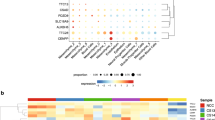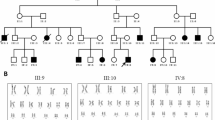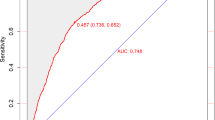Abstract
ATP-binding cassette (ABC) proteins in the placenta regulate fetal exposure to xenobiotics. We hypothesized that functional polymorphisms in ABC genes influence risk for non-syndromic oral clefts (NSOC). Both family-based and case–control studies were undertaken to evaluate the association of nine potentially functional single-nucleotide polymorphisms within four ABC genes with risk of NSOC. Peripheral blood DNA from a total of 150 NSOC case-parent trios from Singapore and Taiwan were genotyped, as was cord blood DNA from 189 normal Chinese neonates used as controls. In trios, significant association was observed between the ABCB1 single-nucleotide polymorphisms and NSOC (P<0.05). Only ABCB1 rs1128503 retained significant association after Bonferroni correction (odds ratio (OR)=2.04; 95% confidence interval (CI)=1.42–2.98), while rs2032582 and rs1045642 showed nominal significance. Association with rs1128503 was replicated in a case–control analysis comparing NSOC probands with controls (OR=1.58; 95% CI=1.12–2.23). A comparison between the mothers of probands and controls showed no evidence of association, suggesting NSOC risk is determined by fetal and not maternal ABCB1 genotype. The two studies produced a combined OR of 1.79 (95% CI=1.38–2.30). The T-allele at rs1128503 was associated with higher risk. This study thus provides evidence that potentially functional polymorphisms in fetal ABCB1 modulate risk for NSOC, presumably through suboptimal exclusion of xenobiotics at the fetal–maternal interface.
Similar content being viewed by others
Log in or create a free account to read this content
Gain free access to this article, as well as selected content from this journal and more on nature.com
or
References
Gupta RC, Sastry BV : Toxicology of the Placenta, in General and Applied Toxicology, eds Ballantyne B, Marrs T, Syversen T, 1233–1263 Grove’s Dictionaries, Inc: New York, 2000).
St-Pierre MV, Serrano MA, Macias RI et al: Expression of members of the multidrug resistance protein family in human term placenta. Am J Physiol Regul Integr Comp Physiol 2000; 279: R1495–R1503.
Derijcke A, Eerens A, Carels C : The incidence of oral clefts: a review. Br J Oral Maxillofac Surg 1996; 34: 488–494.
Cooper Me, Ratay JS, Marazita ML : Asian oral-facial cleft birth prevalence. Cleft Palate Craniofac J 2006; 43: 580–589.
Jugessur A, Murray JC : Orofacial clefting: recent insights into a complex trait. Curr Opin Genet Dev 2005; 15: 270–278.
Arpino C, Brescianini S, Robert E et al: Teratogenic effects of antiepileptic drugs: use of an International Database on Malformations and Drug Exposure (MADRE). Epilepsia 2000; 41: 1436–1443.
Little J, Cardy A, Munger RG : Tobacco smoking and oral clefts: a meta-analysis. Bull World Health Organ 2004; 82: 213–218.
Lorente C, Cordier S, Goujard J et al: Tobacco and alcohol use during pregnancy and risk of oral clefts. Occupational Exposure and Congenital Malformation Working Group. Am J Public Health 2000; 90: 415–419.
Natsume N, Kawai T, Ogi N, Yoshida W : Maternal risk factors in cleft lip and palate: case control study. Br J Oral Maxillofac Surg 2000; 38: 23–25.
Hernandez-Diaz S, Werler MM, Walker AM, Mitchell AA : Folic acid antagonists during pregnancy and the risk of birth defects. N Engl J Med 2000; 343: 1608–1614.
Laird NM, Lange C : Family-based designs in the age of large-scale gene-association studies. Nat Rev Genet 2006; 7: 385–394.
Gauderman WJ : Sample size requirements for matched case-control studies of gene-environment interaction. Stat Med 2002; 21: 35–50.
Kim RB, Leake BF, Choo EF et al: Identification of functionally variant MDR1 alleles among European Americans and African Americans. Clin Pharmacol Ther 2001; 70: 189–199.
Tang K, Ngoi SM, Gwee PC et al: Distinct haplotype profiles and strong linkage disequilibrium at the MDR1 multidrug transporter gene locus in three ethnic Asian populations. Pharmacogenetics 2002; 12: 437–450.
Sham PC, Curtis D : An extended transmission/disequilibrium test (TDT) for multi-allele marker loci. Ann Hum Genet 1995; 59: 323–336.
Kazeem GR, Farrall M : Integrating case-control and TDT studies. Ann Hum Genet 2005; 69: 329–335.
Gil S, Saura R, Forestier F, Farinotti R : P-glycoprotein expression of the human placenta during pregnancy. Placenta 2005; 26: 268–270.
Mathias AA, Hitti J, Unadkat JD : P-glycoprotein and breast cancer resistance protein expression in human placentae of various gestational ages. Am J Physiol Regul Integr Comp Physiol 2005; 289: R963–R969.
Sun M, Kingdom J, Baczyk D, Lye SJ, Matthews SG, Gibb W : Expression of the multidrug resistance P-glycoprotein, (ABCB1 glycoprotein) in the human placenta decreases with advancing gestation. Placenta 2006; 27: 602–609.
Mao Q : BCRP/ABCG2 in the placenta: expression, function and regulation. Pharm Res 2008; 25: 1244–1255.
Pascolo L, Fernetti C, Pirulli D, Crovella S, Amoroso A, Tiribelli C : Effects of maturation on RNA transcription and protein expression of four MRP genes in human placenta and in BeWo cells. Biochem Biophys Res Commun 2003; 303: 259–265.
Meyer zu Schwabedissen HE, Jedlitschky G, Gratz M et al: Variable expression of MRP2 (ABCC2) in human placenta: influence of gestational age and cellular differentiation. Drug Metab Dispos 2005; 33: 896–904.
Ceckova-Novotna M, Pavek P, Staud F : P-glycoprotein in the placenta: expression, localization, regulation and function. Reprod Toxicol 2006; 22: 400–410.
Kolwankar D, Glover DD, Ware JA, Tracy TS : Expression and function of ABCB1 and ABCG2 in human placental tissue. Drug Metab Dispos 2005; 33: 524–529.
Lankas GR, Wise LD, Cartwright ME, Pippert T, Umbenhauer DR : Placental P-glycoprotein deficiency enhances susceptibility to chemically induced birth defects in mice. Reprod Toxicol 1998; 12: 457–463.
Smit JW, Huisman MT, van Tellingen O, Wiltshire HR, Schinkel AH : Absence or pharmacological blocking of placental P-glycoprotein profoundly increases fetal drug exposure. J Clin Invest 1999; 104: 1441–1447.
Hitzl M, Schaeffeler E, Hocher B et al: Variable expression of P-glycoprotein in the human placenta and its association with mutations of the multidrug resistance 1 gene (MDR1, ABCB1). Pharmacogenetics 2004; 14: 309–318.
Sherif A-R, Tatiana N, Gary DVH, Mahmoud A : Effect of the G2677A/T polymorphism in the multidrug resistance 1 gene (MDR1, ABCB1) on P-glycoprotein (P-gp) expression in human placenta. Am J Obs Gyn 2007; 197: S172.
Tanabe M, Ieiri I, Nagata N et al: Expression of P-glycoprotein in human placenta: relation to genetic polymorphism of the multidrug resistance (MDR)-1 gene. J Pharmacol Exp Ther 2001; 297: 1137–1143.
Haenisch S, Zimmermann U, Dazert E et al: Influence of polymorphisms of ABCB1 and ABCC2 on mRNA and protein expression in normal and cancerous kidney cortex. Pharmacogenomics J 2007; 7: 56–65.
Meissner K, Jedlitschky G, Meyer zu Schwabedissen H et al: Modulation of multidrug resistance P-glycoprotein 1 (ABCB1) expression in human heart by hereditary polymorphisms. Pharmacogenetics 2004; 14: 381–385.
Jeong H, Herskowitz I, Kroetz DL, Rine J : Function-altering SNPs in the human multidrug transporter gene ABCB1 identified using a Saccharomyces-based assay. PLoS Genet 2007; 3: e39.
Aird RE, Thomson M, Macpherson JS, Thurston DE, Jodrell DI, Guichard SM : ABCB1 genetic polymorphism influences the pharmacology of the new pyrrolobenzodiazepine derivative SJG-136. Pharmacogenomics J 2008; 8: 289–296.
Vaclavikova R, Nordgard SH, Alnaes GI et al: Single nucleotide polymorphisms in the multidrug resistance gene 1 (ABCB1): effects on its expression and clinicopathological characteristics in breast cancer patients. Pharmacogenet Genomics 2008; 18: 263–273.
Abu-Qare Aw, Elmasry E, Abou-Donia MB : A role for P-glycoprotein in environmental toxicology. J Toxicol Environ Health B Crit Rev 2003; 6: 279–288.
Mathijssen RH, Marsh S, Karlsson MO et al: Irinotecan pathway genotype analysis to predict pharmacokinetics. Clin Cancer Res 2003; 9: 3246–3253.
Kimchi-Sarfaty C, Oh JM, Kim IW et al: A "silent" polymorphism in the MDR1 gene changes substrate specificity. Science 2007; 315: 525–528.
Wang D, Johnson AD, Papp AC, Kroetz DL, Sadee W : Multidrug resistance polypeptide 1 (MDR1, ABCB1) variant 3435C>T affects mRNA stability. Pharmacogenet Genomics 2005; 15: 693–704.
Wang Z, Wang J, Tantoso E et al: Signatures of recent positive selection at the ATP-binding cassette drug transporter superfamily gene loci. Hum Mol Genet 2007a; 16: 1367–1380.
Mizuarai S, Aozasa N, Kotani H : Single nucleotide polymorphisms result in impaired membrane localization and reduced ATPase activity in multidrug transporter ABCG2. Int J Cancer 2004; 109: 238–246.
Kobayashi D, Ieiri I, Hirota T et al: Functional assessment of ABCG2 (BCRP) gene polymorphisms to protein expression in human placenta. Drug Metab Dispos 2005; 33: 94–101.
Tamura A, Wakabayashi K, Onishi Y et al: Re-evaluation and functional classification of non-synonymous single nucleotide polymorphisms of the human ATP-binding cassette transporter ABCG2. Cancer Sci 2007; 98: 231–239.
Yeo GW, Van Nostrand EL, Liang TY : Discovery and analysis of evolutionarily conserved intronic splicing regulatory elements. PLoS Genet 2007; 3: e85.
Acknowledgements
We are grateful to all participants who donated samples for this multi-center collaborative research on oral clefts. This research was supported by grants from the United States National Institute of Dental and Craniofacial Research (No. R21-DE-013707 and R01-DE-014581) and the Singapore National Healthcare Group (No. NHG BRG/01004). Dr Omoumi was supported by an International Graduate Scholarship from A*STAR (Agency for Science, Technology and Research), Singapore.
Author information
Authors and Affiliations
Corresponding author
Ethics declarations
Competing interests
The authors declare no conflict of interest.
Additional information
Supplementary Information accompanies this paper on European Journal of Human Genetics website
Supplementary information
Rights and permissions
About this article
Cite this article
Omoumi, A., Wang, Z., Yeow, V. et al. Fetal polymorphisms at the ABCB1-transporter gene locus are associated with susceptibility to non-syndromic oral cleft malformations. Eur J Hum Genet 21, 1436–1441 (2013). https://doi.org/10.1038/ejhg.2013.25
Received:
Accepted:
Published:
Issue date:
DOI: https://doi.org/10.1038/ejhg.2013.25
Keywords
This article is cited by
-
Rare variants analyses suggest novel cleft genes in the African population
Scientific Reports (2024)



